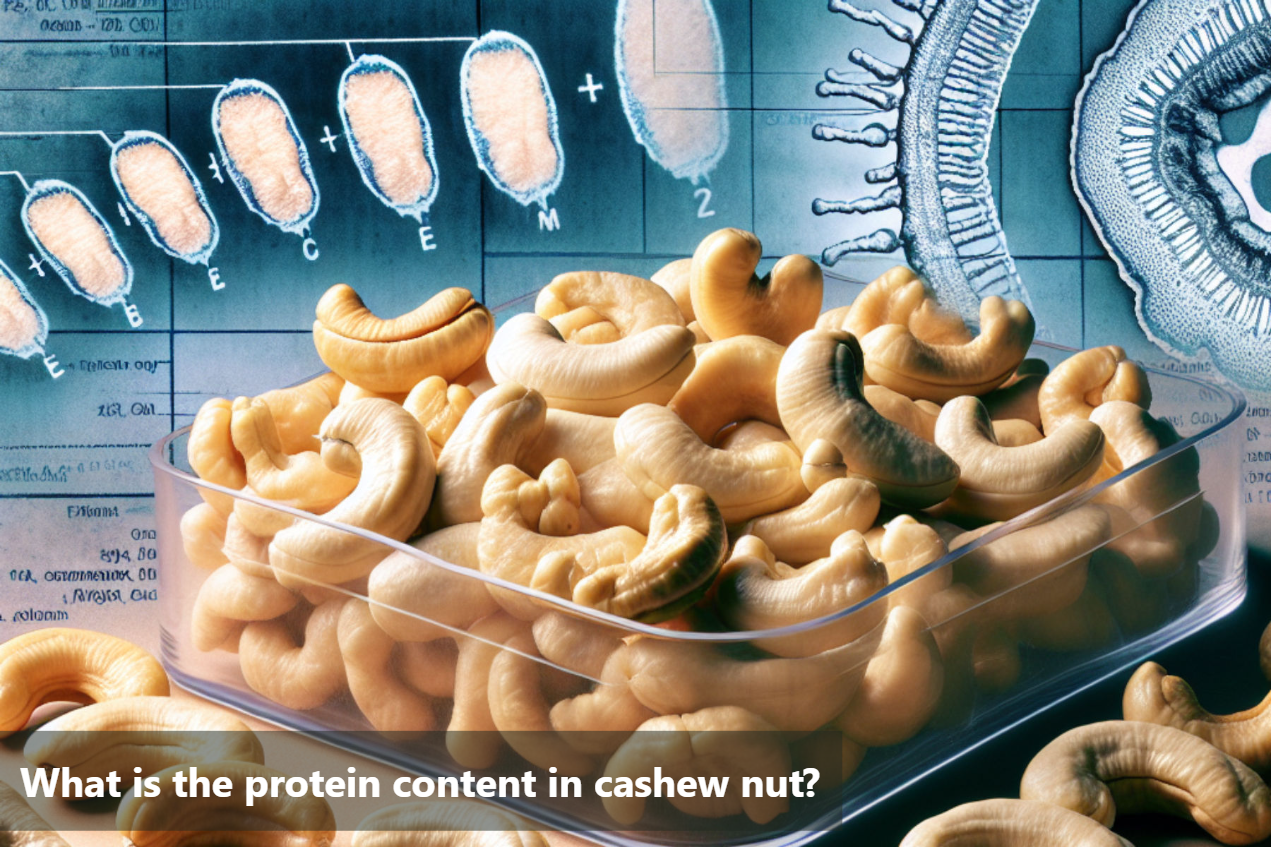
What is the protein content in cashew nut?
Cashews are not only delicious but also provide a good amount of protein, making them a valuable addition to a balanced diet. It contain a moderate amount of protein per serving, which can contribute to meeting your daily protein requirements. Whether you are looking for a quick snack or a nutritious addition to your meals, cashews offer a convenient way to boost your protein intake.
Understanding the protein content in cashew nuts can help you make informed dietary choices. Whether you consume a single cashew nut or a handful of them, you are benefiting from the protein they offer. Additionally, if you are curious about the protein content of cashews in 100g servings, you can easily compare it to other nuts to see how they stack up in terms of protein content.
Incorporating protein-rich foods like cashew nuts into your daily diet can help you meet your nutritional needs and support your overall health and wellness goals.

Nutrient Content in Cashew Nuts
1 ounce (oz) or 28.35 grams of cashew nuts contain:
Nutrient |
Amount |
Nutrient reference value for adults (%) |
|---|---|---|
calories |
166 kilocalories (kcal) |
— |
carbohydrates |
8.99 g |
3.2% Trusted Source |
protein |
4.21 g |
8.42% |
fiber |
0.82 g |
2.9% |
total fat |
13.6 g |
17.4% |
calcium |
12.5 milligrams (mg) |
1% Trusted Source |
copper |
0.61 mg |
67.7% |
iron |
1.65 mg |
9.1% |
magnesium |
71.4 mg |
17% |
phosphorous |
135 mg |
10.8% |
potassium |
155 mg |
3.3% |
sodium |
4.54 mg |
0.2% |
zinc |
1.54 mg |
14% |
Factors affecting protein content
Varietal Differences: Different varieties of cashew trees may produce nuts with slightly varying nutritional profiles, including protein content.
Soil Quality: The nutrient content of the soil where the cashew trees are grown can affect the nutritional value of the nuts, including their protein levels. Soil rich in organic matter and essential nutrients tends to produce nuts with better nutritional quality.
Climatic Conditions: The climate, including temperature, rainfall, and humidity, where cashew trees grow can influence their growth and development, potentially affecting the nutritional composition of the nuts.
Harvesting Time: The stage of maturity at which cashew nuts are harvested can impact their nutritional value. Nuts harvested either too early or too late might not have the same protein content as those harvested at the optimal time.
Storage Conditions: Post-harvest handling and storage conditions, such as temperature and humidity, can affect the quality and nutritional content of cashew nuts. Improper storage can lead to degradation of nutrients, including proteins.
Processing Methods: The way cashew nuts are processed (e.g., roasting, salting, or oil-frying) can also impact their nutritional content. Some processing methods may reduce the protein content or affect the nuts' overall nutritional profile.
Benefits & Side Effects
Benefits
Rich in Nutrients: Cashews are a good source of magnesium, iron, zinc, and phosphorus, which are vital for energy production, brain health, and immunity.
Heart Health: They contain healthy fats, such as monounsaturated and polyunsaturated fatty acids, which can help reduce LDL cholesterol levels and improve heart health.
Weight Management: Despite being high in calories, cashews can be a part of a weight management plan when consumed in moderation, as they are filling and can help curb cravings.
Blood Sugar Control: Cashews have a low glycemic index, which means they can help in controlling blood sugar levels, making them a good choice for people with diabetes when eaten in moderation.
Good for the Skin: They are rich in copper, which helps in the production of collagen and elastin, contributing to firmer, more flexible skin.
Side Effects
High in Calories: Cashews are calorie-dense, so eating them in large quantities can contribute to weight gain.
Potential Allergies: Like other nuts, cashews can trigger allergic reactions in some individuals, which can range from mild to severe.
Kidney or Gallbladder Issues: Cashews contain moderate amounts of oxalates. High levels of oxalates can contribute to kidney stone formation, and individuals with kidney or gallbladder issues may need to limit their intake.
High Sodium Content: If consuming salted cashews, be aware of their high sodium content, which can lead to elevated blood pressure and other cardiovascular issues when consumed excessively.
Drug Interactions: The magnesium in cashews can interact with certain medications, including diuretics and antibiotics, potentially affecting their effectiveness.

Evaluating the Protein Value of Cashew Nuts
Cashew nuts are a remarkable source of plant-based protein, making them an excellent addition to a balanced diet. When examining the protein content, it is fascinating to note that a single cashew nut contains approximately 0.3 grams of protein, contributing to its nutritional value. For those looking to increase their protein intake, incorporating cashews into their daily snack or meal can be beneficial.
Moreover, exploring the protein content in various quantities of cashew nuts reveals interesting insights. For instance, consuming 5 cashews provides around 1.5 grams of protein, while having 10 cashews doubles the protein intake to approximately 3 grams. This highlights the versatility of cashews in meeting individual dietary preferences and requirements.
When comparing the protein content of cashew nuts to other nuts, it becomes evident that cashews offer a significant amount of protein per 100 grams. This makes them a favorable choice for individuals seeking plant-based protein sources.
This Blog post is an initiative by Lo! Foods, to provide accurate and Nutritionist / Doctor approved information related to Health. Lo! Foods is India's leading brand for Everyday Functional Foods. Foods designed for specific Health conditions or Needs. Lo! Foods also runs India's largest range of Low Carb Healthy Cloud Kitchens, under the brand names of Lo!, ProteinChef, ATH (All Things Healthy) and DiabeSmart.











Leave a comment
Your email address will not be published.